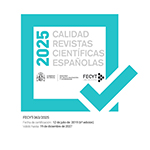Facing heteropatriarchal epistemologies: theoretical-methodological elements for a Feminist analysis on violence against women.
Abstract
Against the forms and processes through which heteropatriarchy creates knowledge and constructs discourses around gender violence or machista violence (heteropatriarchal epistemologies), the feminist resistance has worked tirelessly in the construction of new frameworks and interpretations. As a contribution to this process, this article aims to share a methodological proposal consistent with a feminist analysis of violence against women. As a result of the theoretical review and epistemological reflection that emerges from a research of the phenomenon in the activist communities of the Basque Country, the proposal is sustained on the analysis of ten narratives of women activists who have survived violence. Place women’s voices at the centre when it comes to developing theory, recognize women’s agency and identify the manifestations of resistance and survival, the consideration of its intersection with other strands of oppression, or a multidisciplinary approach to the phenomenon, are a few of the methodological keys that have been raised from feminist theory and practice, in order to promote a type of knowledge production that contributes to fracturing heteropatriarchal imaginary of violence, and creating better strategies for counter-hegemonic struggle. As a result of the theoretical review and epistemological reflection that emerges from a research of the phenomenon in the activist communities of the Basque Country, the proposal is sustained on the analysis of ten narratives of women activists who have survived violence.
Downloads
Article download
License
In order to support the global exchange of knowledge, the journal Investigaciones Feministas is allowing unrestricted access to its content as from its publication in this electronic edition, and as such it is an open-access journal. The originals published in this journal are the property of the Complutense University of Madrid and any reproduction thereof in full or in part must cite the source. All content is distributed under a Creative Commons Attribution 4.0 use and distribution licence (CC BY 4.0). This circumstance must be expressly stated in these terms where necessary. You can view the summary and the complete legal text of the licence.











